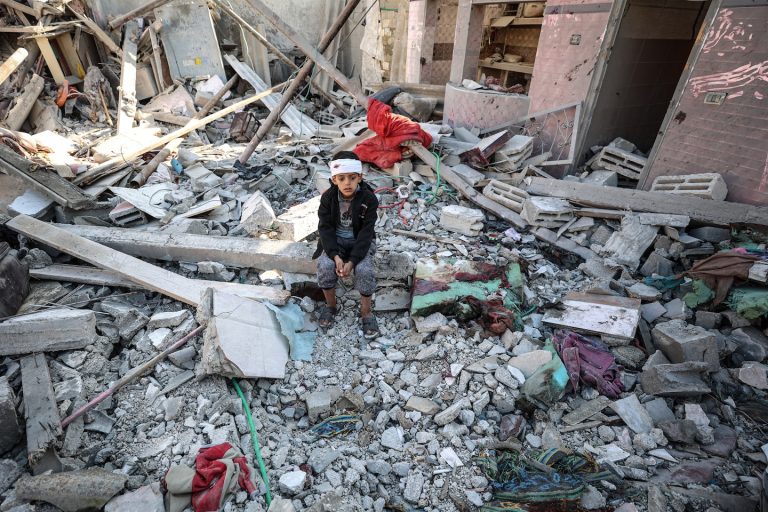The United Nations Relief and Works Agency, or UNRWA, played a vital role in distributing international aid to Gaza during the war. But after Israel alleged that more than a dozen UNRWA employees were involved in Hamas-led attacks on Israeli towns on October 7, the United States and at least nine other donor countries suspended their funding pending further investigation.
Critics of the move say it will only worsen the humanitarian catastrophe in Gaza, with UN officials warning the impact will be felt within weeks. Speaking before the Security Council on Wednesday, UN humanitarian aid chief Martin Griffiths said efforts in Gaza “depend entirely on UNRWA being adequately funded and operational” and called for funding to be resumed immediately.
The dispute over UNRWA funding comes amid growing debate over who should pay for Gaza as the cost of the conflict rises. In a report released Wednesday, UN economic development experts wrote that “there is no doubt” that returning Gaza to its pre-war state would require “several tens of billions of dollars by any conservative estimate.” Current pledges from donor countries will be several times less than that.
The Biden administration has pinned its hopes on Arab countries to help rebuild Gaza, on the condition that Israel agrees to recognize the Palestinian state. But during a joint press conference with his Saudi counterpart on Sunday, Egyptian Foreign Minister Sameh Shoukry criticized the decision to withdraw funding from UNRWA, warning of “unjustified scapegoating” of all of the agency’s employees, who total about 30,000, including about 12,000 in Gaza.
For UNRWA, funding issues are not new. The year after a previous round of war in Gaza in 2014, officials from the UN agency announced that they had to suspend reconstruction efforts in the Strip because they had run out of money: while countries pledged $5.4 billion in aid, “almost nothing was done.” “It has arrived in Gaza,” the agency said in a statement.
In 2018, the Trump administration announced it would cut its funding to UNRWA, a move the agency said would leave it with a funding gap of up to $446 million. While other countries stepped in to help fill the gap, there was still a $200 million shortfall, UNRWA officials told The Washington Post at the time. US funding was restored during the Biden administration.
At the beginning of 2023, UNRWA Commissioner Philippe Lazzarini told reporters that the country had a deficit of $70 million in the previous year – the fourth year in a row that it had lost money. He pointed out that some major donors in the past, including Britain, reduced their contributions to foreign aid in general, but specifically targeted Arab countries that had allowed their contributions to UNRWA to collapse in recent years.
“I have noticed some trends in the region,” he told reporters when asked about financing these countries last year. “The first? Indeed, the Arab contribution in 2018 represented about 25 percent of the total contribution to the agency. In 2021, it was less than 3 percent, and last year it was 4 percent.
This week's aid suspension could pose a much bigger problem if it is not resolved. To date, 11 separate donors have suspended their funding. The United States provided $344 million in funding in 2022, according to UNRWA statistics, making it the agency's largest donor. Germany, the second largest donor country, also suspended its funding this week.
UNRWA pledged to conduct an internal investigation into the Israeli allegations and immediately dismissed nine employees, while the UN's top investigative body, the New York-based Office of Internal Oversight Services, is working on a separate investigation. The United States and other countries have indicated that they may restore funding if UNRWA makes changes.
But for many Israel supporters, the solution is to get rid of UNRWA forever. Critics of the agency have long argued that the agency's work should fall under the United Nations High Commissioner for Refugees (UNHCR), a separate UN body focused on resettling refugees who cannot return to their homes.
Speaking to reporters on Tuesday, a spokesman for Prime Minister Benjamin Netanyahu's office said UNRWA was “fundamentally compromised” by Hamas, claiming without evidence that nearly 10 percent of the agency's staff in the Gaza Strip are members of it or another armed group. “It's more than a dozen bad apples. Add two zeros. Make it 1,200,” spokesman Elon Levy said.
In a statement on Wednesday, the heads of several UN organizations – including the UN High Commissioner for Refugees – warned that there was no alternative to UNRWA and that suspending funding to the agency “would have catastrophic consequences” for those in Gaza. “No other entity has the capacity to provide the scale and scope of assistance that the 2.2 million people in Gaza urgently need,” they wrote.
In the short term at least, even Israeli officials might agree. The Times of Israel quoted an official who spoke on condition of anonymity as saying: “If UNRWA stops working on the ground, this could cause a humanitarian catastrophe that will force Israel to stop its fight against Hamas.” He added: “This will not be in the interest of Israel and will not be in the interest of Israel's allies either.”
But it is not only Israel, nor the West, that wants to allow UNRWA to wither. My message to the Arab world, especially to the Gulf: Where are you? Chris Gunness, a former UNRWA spokesman, told Al Jazeera this weekend. “Because they earn billions every day from oil revenues. A small portion of those oil revenues would make UNRWA's financial problems disappear overnight.

